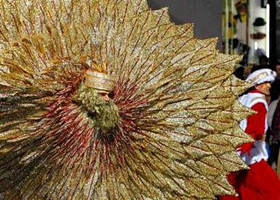 |
 |
 |
 News from Around the Americas | January 2006 News from Around the Americas | January 2006  
A Day Fit For Three Kings
 Jeannie Kever - Houston Chronicle Jeannie Kever - Houston Chronicle


| | A man dressed as a page of the 'Three Wise Men' takes part in the traditional Epiphany parade in central Barcelona January 5, 2006. Traditionally children in Spain receive their Christmas presents on the morning of January 6 delivered by the 'Three Wise Men.' (Reuters/Albert Gea) |
It is official. Christmas is over.

For many people, the occasion will be marked by a ring of sweetbread, concealing a tiny baby Jesus.

Three Kings Day, also known as Epiphany, is celebrated today across Latin America and Europe in recognition of the three kings who came with their gifts of gold, frankincense and myrrh for the Christ child 12 days after Christmas.

In Louisiana, today is hailed as the start of Carnival.

In Houston, it will be marked by long lines at Mexican bakeries.

"The police come out and close the streets down," joked Robert Clair, executive vice president of Taqueria Arandas, which will churn out thousands of the Mexican pastries known as rosca de reyes at the chain's four bakeries. "It's a zoo."

Children in Mexico place their stockings under the Christmas tree on Jan. 5, awakening the next morning to find them filled with gifts delivered by the three kings, said Andrew Chesnut, a professor of Latin American history at the University of Houston.

Some families who have recently arrived in the United States still give their children gifts on Three Kings Day, said the Rev. Miguel Solorzano, a priest at St. Philip of Jesus Catholic Church. "But since most of their children were born in the United States, they are losing that tradition."

Even in Mexico, Solorzano said, the Jan. 6 gift-giving is waning as Christmas becomes more commercialized.

But the rosca lives.

Rosca de reyes is similar to the King Cake associated with Mardi Gras.

In Mexico, the cakes have a plastic figure of a baby — symbolizing the baby Jesus — baked inside, said Ann Ball of Houston, who has written several books on Catholic traditions.

The person who finds the baby is obligated to throw a party on Feb. 2, Candlemas Day. That is the final feast day associated with Christmas, signifying the presentation of Jesus 40 days after his birth.

Some people put more than one baby figure in their roscas, allowing the cost of the Feb. 2 party to be spread around, Chesnut said. (Whoever finds the baby in a Mardi Gras King Cake is expected to buy the next cake.)

The rosca is typically served with hot chocolate, Chesnut said, while the menu for a Candlemas party would include tamales, chocolate and atole, a corn-based drink.

Christmas and Santa Claus are gaining ground on Three Kings Day in Mexico, but Chesnut said the traditions of Jan. 6 remain important.

"I think in the face of the globalization, which in part means Americanization, of their culture, it's a valuable way for Mexicans to set boundaries," he said.

That makes it an important tradition for Hispanics in the United States, too, although Chesnut said retaining cultural identity is less of an issue in Houston and other cities with large Hispanic populations.

Here, the problem may be getting a rosca. Many people order theirs ahead of time — the parties started Thursday night and will continue today — but bakeries will sell them all day.

Be patient, however.

"Sometimes there's a very long wait," Clair said.

jeannie.kever@chron.com | 
 | |
 |



